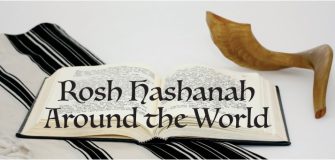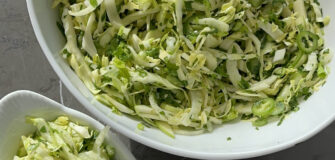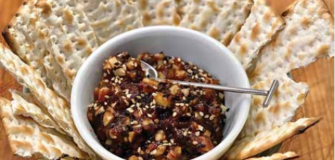Spice King Lior Lev Sercarz

Lior Lev Sercarz is the chef, spice blender, and owner of La Boîte, a biscuit and spice shop in New York City. Born and raised in Israel, Lior started cooking after his military service. A trip to South America deepened his interest in cooking, after which he attended culinary school at the acclaimed Institut Paul Bocuse in Lyon, France. In 2002, Lior brought his newfound understanding of spice blending with him to New York. In 2006 he started La Boîte, launching the company by making and selling a line of French biscuits, as well as experimenting with the use of spices.
Debra Eckerling: How did you become the Spice King?
Lior Lev Sercarz: I was always fascinated with spices, growing up in Israel, going to the market, seeing how people cook. I guess the main change happened, while working in a restaurant with a chef that was very well known for his usage of spices. He got me into the whole research and the history and the growing. So, when I was kind of debating where to go next, after so many years in the restaurant business, I tried to give it a chance.
So I took another cooking job that allowed me to have free time and started blending spices for restaurants. In the beginning, just New York, and then it expanded slowly. It’s 16 years later and we’re serving over 700 establishments in the United States: restaurants and bars and hotels and airlines and whatnot. And then thousands of households around the country.
What we set up to do is really to change the way people think about food and cook, while using spices, so exposing them to ethnic cuisines and to cultural influences and showcasing them. It doesn’t matter how complex the food is that you’re preparing, spices should be considered as part of it.
Debra: A spice really can make or break a meal, right?
Lior: Absolutely, even if it’s the dayto-day stuff that you’re using: salt, pepper, cumin, paprika. What we try to get people on board with is this idea – that you should at least try to source the best possible ingredients – the best salt, and not the best global, but the best for you. And why spend so much money on produce and protein and then use some bad spices to season it. It doesn’t do it justice.
Debra: When you mix spices, is it usually several? What has been your biggest spice blend?
Lior: We do two things. We offer products as single spices, as they are or ground. The majority of what we do are actually spice blends. You need two to have a blend. Beyond that, the majority are somewhere around 9, 10 components per blend, although we have some very successful ones that are only 3 or 4 ingredients. The one that has the most, I think, has about 19 ingredients. not because Lior Lev Sercarz Interview with Debra Eckerling Photo by Thomas Schauer was trying to make something fancy and complicated. It just happens to be that that was the formula that I ended up with.
Debra: How do you find good spices?
Lior: When you go to a store that you trust, whether it’s a specialty store or supermarket, or your butcher or fishmonger – with people that you trust for whatever else they are selling – chances are that they’re also going to carry good quality spices.
Go to places where you can have a conversation with the team and ask them what they know about the spices. Also, just by evaluating the packaging – if it’s packed properly – there’s a lot of indication about the spice itself. So those are all things that you could do without even opening anything at the store level.
Debra: How do you tell if something is a good spice as opposed to a bad one?
Lior: Usually visually by color. So you want to buy black peppercorns but the package has some gray and brown, that could be an indication that this was poorly sorted or harvested.
If it says it’s a whole peppercorn, yet there is a tremendous amount of dust and powder in the packaging, this might indicate that it’s been there for too long. Obviously, once you open the packet, it’s simply analyzing the scent and the flavor. And If it has none of the above, then obviously there’s something wrong with it.
It should have a great scent and a great flavor. It could be very strong. That’s a good thing. That means that the product is pretty fresh.
Debra: Are there spices that work particularly well for Passover meals?
Lior: I think Passover is great, and happens to be one of my favorite times of year. What’s interesting is because there’s so many classic dishes – again, depending on who you are and where you are from – there’s a lot of great opportunities. Most people are going to make matzo ball soup, so why not jazz it up a little bit each time, and try something different for the broth itself, for the matzo balls themselves.
I like to play around with different things every time I make them.
Debra: For example?
Lior: For herbs for the broth, if you want to be a bit more classic, use some basil and thyme and maybe oregano. But if you want to go a bit more exotic, lemongrass or basil would work really nicely.
And then the matzo balls themselves, you could use things like coriander and fennel and cumin. You could stuff your matzo balls with either meat or vegetables. We have a recipe for matzo balls with nigella seeds in them. So then we get a little bit of crunch and texture. That’s also very nice.
The same goes for your chopped liver and your brisket and whatever it is that you are trying to do. There’s an opportunity to change them a little bit and make each Passover a bit more exciting.




























